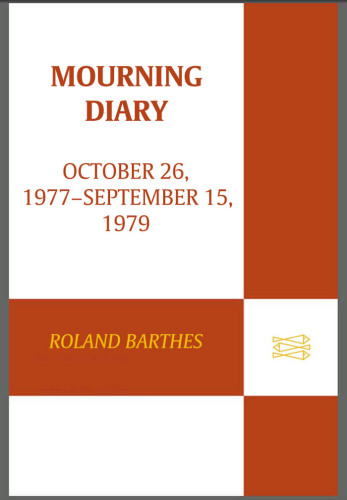
Mourning Diary
کتاب های مرتبط
- اطلاعات
- نقد و بررسی
- دیدگاه کاربران
نقد و بررسی

Starred review from May 24, 2010
These pensées on the process of grieving the loss of a mother are an invitation to eavesdrop on a densely qualified (in the finest sense) rational mind touched by eternal loss. While continuing his life work, the great French cultural critic Barthes (Mythologies) kept notes of sadness and selfreflection on slips of paper. This fragmentary book begins the night after his mother's death; informing it all is the presence of absence. Although conflicted by the very process of making literature from grief, Barthes (1915–1980) contemplates such day-to-day, unexpected spells of sadness as living in an empty apartment; how the role reversal of caring for a dying parent affected him; the larger mysteries of time; and his own generalized mental state ("Not even the desire to commit suicide"). Compiler and annotator Léger is to be commended, as is redoubtable translator Howard, who, in a nostalgic afterword, describes both his experience with Barthes's mother, Henriette, and the relative merits of the craft of rendering any book into another language. This volume is both a window into the soul of a philosopher and a unique contribution to the inspirational literature of the adult child left behind. 8 pages of b&w illus.

July 1, 2010
The French philosopher opens his heart in a book he never intended to publish.
Following the death of his mother in 1977, Barthes (1915–1980) mourned her with a series of daily reflections written on typewriter paper that he had cut into quarters. These served to focus and distill the writing, which he would do in the morning before working on his course preparation and his last masterwork, Camera Lucida (1980). "Suffering, like a stone... / (around my neck, / deep inside me)" he writes on Mar. 24, 1978, and then underscores the image a couple weeks later: "Despair: the world is too theatrical, a part of the language. // A stone." The author uses Proust as a frequent point of comparison, with references to Tolstoy and others as well. Though there is little suggestion that Barthes is writing for anyone but himself, he ponders early in the process, "Who knows? Maybe something valuable in these notes?" His musings encompass not only the death of his mother but the essence of mortality: "The truth about mourning is quite simple: now that maman is dead, I am faced with death (nothing any longer separates me from it except time)." As the anniversary of her death approaches: "As for death, maman's death gave me the (previously quite abstract) certainty that all men are mortal—that there would never be any discrimination—and the certainty of having to die by that logic soothed me." Yet such soothing doesn't alleviate his suffering, as he subsequently acknowledges: "I write my suffering less and less yet it grows all the stronger, shifting to the realm of the eternal, since I no longer write it." With one entry to a page and reproductions from the writer's diary cards, the volume invites comparison with Nabokov's posthumously published The Original of Laura (2009), yet where that novel remains incomplete, each of these entries is complete in itself.
A catharsis for writer and reader alike.
(COPYRIGHT (2010) KIRKUS REVIEWS/NIELSEN BUSINESS MEDIA, INC. ALL RIGHTS RESERVED.)

























دیدگاه کاربران